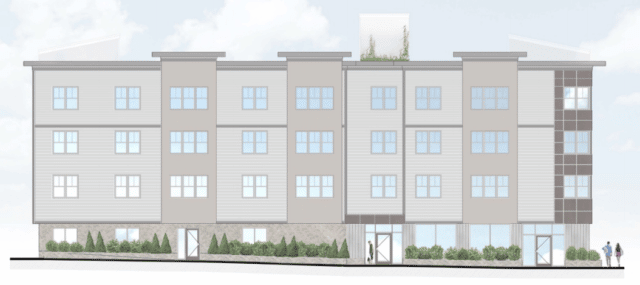
Boston officials are wary of a wave of future multifamily developments containing ground-floor parking decks sapping vitality from Main Street retail districts.
Boston officials are seeking new powers to reject condo and apartment developments that locate parking decks instead of retail shops on the ground floor.
The multifamily housing boom, combined with developers’ recent preference to build podium-style parking, pose a threat to the vibrancy of Main Street retail districts, according to Boston Planning & Development Agency officials. BPDA Deputy Director Bryan Glascock said the goal is to protect cohesive, walkable shopping districts and prevent them from being replaced by blank walls concealing parking garages.
“For those commercial districts to survive, there needs to be a critical mass of attractions so people will get out of their cars and go into storefronts and shop in the adjacent areas as well,” Glascock said.
The proposed zoning amendment – which goes before the zoning commission on June 9 – makes accessory parking a conditional use requiring approval by the Zoning Board of Appeals. Previously, some such projects could be built as-of-right.
Critics say the new rules would have unintended consequences and discourage developers from proposing housing because of the steeper permitting hurdles.
“It’s going to hurt development, and it’s going to hurt Hyde Park,” said Christopher Lydon, a developer and real estate agent for William Raveis in Milton. “The neighborhood doesn’t want development anyway, so I guess that’s what’s going to happen.”
Problematic Podiums Become More Popular
Recent changes in the state building code allow developers to build up to 5 stories of wood-framed buildings above a 1- or 2-story steel or concrete podium, with parking sometimes occupying the podium levels.
The option has become popular because it’s far less expensive than below-grade parking. And many parcels aren’t big enough to accommodate the amount of parking required by zoning – one space per unit, in some districts – in a surface lot.
But as the trend becomes widespread, it threatens the vibrancy of many retail districts located along main arteries outside downtown Boston, Glascock said. Owners of single-story retail buildings are tempted to redevelop them as multi-story residential, and not replace the ground-floor retail.
“We noticed a couple of projects that came up in neighborhood shopping districts with residential over parking podiums,” Glascock said. “Those were as-of-right projects and there was not much anybody could say about it.”
The standard for such conditional use permits is lower than a variance, Glascock noted, and the new rules wouldn’t mean a blanket requirement for ground-floor retail.
“We realize there’s some situations where [podium parking] is going to make sense and first-floor retail may not work,” he said.

West Roxbury residents protested a developer’s plans for a Centre Street condo project, with opponents warning a “canyon of condos” would replace the heart of the neighborhood business district. Image courtesy AD Architects
Fear of a ‘Canyon of Condos’
Plans to replace a pair of vacant commercial buildings with a 21-unit condo building prompted a roadside protest by West Roxbury residents this month. Canton-based CAD Builders proposes a 4-story, 28,000-square-foot building including a small ground-floor commercial unit designated for banking, postal or health care uses, according to a small project application.
At a community meeting and the protest, residents and West Roxbury Business and Professional Association President Jim Hennigan III warned about a “canyon of condos” replacing the heart of the neighborhood business district.
Hennigan did not respond to requests to comment left via voicemail or email.
Lydon, the real estate agent and developer, has sought to develop a 12-unit multifamily building with ground-floor parking to replace a vacant lot at 24 Winthrop St. in Hyde Park.
The project would have included 12 parking spaces, the minimum required by zoning. The BPDA refused to provide a design review for the project, citing the pending zoning amendment, Lydon said.
Developers Leery of Some Retail
Retail space can be an afterthought to some multifamily developers, given the small percentage of the property’s income generated by storefront tenants. And developers are leery of retail tenants that may create unwanted noise or odors that would make the residential units harder to market, noted Eric Shabshelowitz, vice president of commercial for Boston-based Cabot & Co.
Retail shops in Boston’s outlying neighborhoods were in a precarious position even before COVID added another threat to the future of Main Street business districts.
“Municipalities generally encourage cafes and businesses like salons and neighborhood services,” Shabshelowitz said. “The challenge is there are only so many of those types of businesses that can coexist and thrive within a certain stretch, and COVID really magnified that.”
A new proposal by City Councilors Kenzie Bok and Matt O’Malley also could help prevent parking requirements from displacing retail from developments, while making it easier to develop affordable housing.

Steve Adams
The councilors submitted a zoning amendment on May 19 to eliminate on-site parking requirements for any development containing 100 percent affordable housing.
Bok said the measure was prompted by recent lawsuits challenging affordable housing projects, including separate suits filed by Jamaica Plain commercial landlord Montgomery Gold against a 38-unit senior housing development at 3377 Washington St. and Pine Street Inn’s plans to build 202 units for formerly homeless people at 3368 Washington St.
“People think they can weaponize parking minimums as a way to extract concessions,” Bok said. “If it works, why not do it again? The only way to prevent that is to get rid of that hook for a lawsuit.”




 |
| 